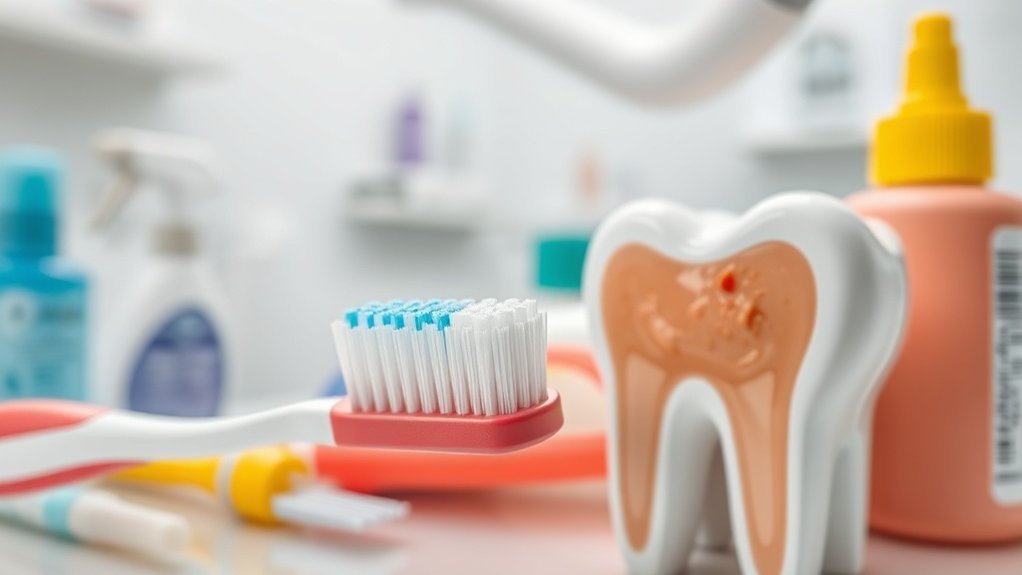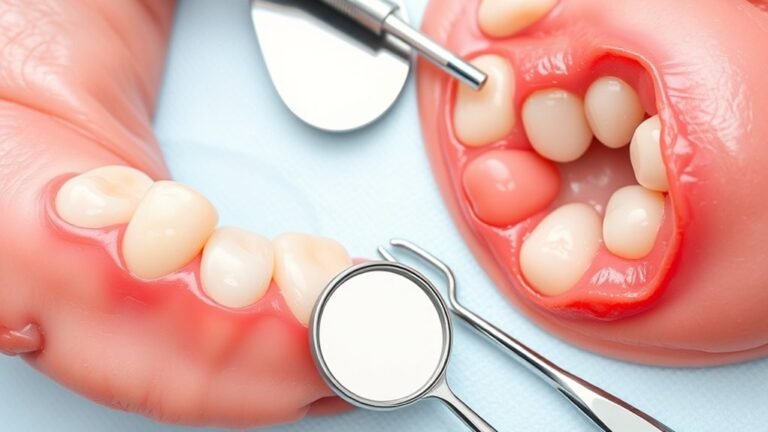Why Do Some Patients Get More Plaque Buildup Despite Brushing Daily
Despite daily brushing, some patients experience increased plaque buildup due to genetic factors, saliva composition, dietary influences, and medications that lead to dry mouth. Genetics can affect the antibacterial properties of saliva and the oral microbiome, while certain diets promote harmful bacteria growth. Additionally, medications can reduce saliva, impairing its natural cleaning ability. Understanding these diverse factors is vital for effective plaque management, and knowing more about oral hygiene can help enhance your dental health.
Key Takeaways
- Genetic factors can influence saliva composition, affecting its ability to neutralize acids and inhibit harmful bacteria, leading to increased plaque buildup.
- Certain medications, such as antidepressants and antihistamines, can cause dry mouth, reducing saliva production and increasing plaque accumulation despite regular brushing.
- Inadequate brushing technique or insufficient time spent brushing may leave hard-to-reach areas prone to plaque buildup.
- A diet high in sugars and acids can promote the growth of harmful bacteria, contributing to plaque formation even with daily brushing.
- Regular dental cleanings are essential, as they remove tartar and plaque that home care may miss, preventing further buildup and gum disease.
Understanding Plaque: What It Is and How It Forms
Understanding plaque is vital for maintaining oral health, as it forms when bacteria in your mouth combine with sugars and starches from the food you eat. This process, known as plaque formation, begins shortly after eating. Bacterial plaque consists of a dense, sticky biofilm that adheres to your teeth, creating an environment conducive to further bacterial growth. If not removed through regular brushing and flossing, plaque can harden into tartar, leading to increased risk for cavities and gum disease. It’s important to recognize that even with diligent oral hygiene, certain factors may contribute to persistent plaque buildup, including diet, saliva composition, and oral care techniques. Understanding these elements allows you to take proactive steps in managing your oral health effectively.
The Role of Genetics in Plaque Buildup
Your genetic makeup plays a significant role in how plaque accumulates on your teeth. Variations in saliva composition can influence the antibacterial properties of your mouth, while differences in immune system responses affect how effectively your body combats plaque buildup. Understanding these genetic factors can help you tailor your oral care routine for better outcomes.
Genetic Predisposition to Plaque
Although regular brushing is essential for oral health, genetic factors can considerably influence an individual’s susceptibility to plaque buildup. Your genetic predisposition to plaque can affect how your body interacts with the oral microbiome. Certain genes may influence the composition and balance of bacteria in your mouth, resulting in a higher likelihood of plaque formation. For instance, some individuals may possess genetic traits that promote a more pathogenic oral microbiome, leading to increased plaque accumulation despite diligent oral hygiene practices. Understanding your genetic predisposition to plaque can help you and your dentist devise personalized strategies to manage your oral health effectively, potentially incorporating additional preventive measures tailored to your unique genetic makeup.
Saliva Composition Variances
While brushing plays an essential role in maintaining oral health, variances in saliva composition—often influenced by genetics—can greatly impact plaque buildup. Your saliva’s unique mixture of proteins, enzymes, and minerals affects how effectively it can neutralize acids and wash away food particles. This composition influences the growth of oral bacteria, which can lead to increased plaque formation despite diligent brushing.
| Saliva Component | Effect on Oral Health |
|---|---|
| Antimicrobial Proteins | Inhibit harmful bacteria growth |
| Enzymes | Break down food particles |
| pH Levels | Maintain acid-base balance |
| Minerals | Strengthen enamel |
| Immunoglobulins | Fight infections |
Understanding these saliva composition variances can help you recognize why some individuals experience more plaque buildup than others.
Immune System Response Differences
Genetic factors greatly influence how your immune system responds to oral bacteria, affecting plaque buildup. Variations in your immune response can lead to differing abilities to control plaque, even with daily brushing. Here are three key factors:
- Inflammatory Response: Some individuals may have a heightened inflammatory response, promoting plaque accumulation.
- Antibody Production: Genetic differences affect the quantity and efficiency of antibodies produced against oral bacteria, impacting plaque control.
- Microbiome Interaction: Your unique genetic makeup may alter how your immune system interacts with the oral microbiome, influencing plaque development.
Understanding these genetic influences on immune response can help tailor effective strategies for managing plaque buildup, ensuring better oral health outcomes.
Dietary Influences on Oral Health
Diet plays an essential role in shaping your oral health, influencing plaque buildup and the overall condition of your teeth and gums. Certain dietary factors, such as high sugar and acid intake, can promote the growth of harmful bacteria, leading to increased plaque formation. Conversely, maintaining a balanced diet rich in fruits, vegetables, whole grains, and lean proteins can support oral health. Nutrients like calcium, vitamin D, and phosphorus strengthen your teeth, while antioxidants help reduce inflammation in your gums. Additionally, hydration is vital, as water helps wash away food particles and bacteria. By consciously choosing a balanced diet, you can greatly improve your oral hygiene and minimize plaque buildup, making your daily brushing efforts more effective.
The Impact of Saliva Composition
Saliva plays an important role in maintaining oral health due to its antimicrobial properties and ability to regulate pH levels in the mouth. You may not realize that variations in saliva composition can greatly impact plaque formation. Understanding these factors is essential for addressing plaque buildup despite your diligent brushing habits.
Saliva’s Antimicrobial Properties
Although brushing your teeth is essential for oral hygiene, the composition of your saliva plays a crucial role in controlling plaque buildup. Saliva’s antimicrobial properties help prevent oral hygiene failures by combating harmful bacteria. Here are three key components of saliva that contribute to its effectiveness:
- Antibodies: Immunoglobulins in saliva target and neutralize pathogens, reducing their ability to form plaque.
- Enzymes: Lysozyme and lactoferrin break down bacterial cell walls, further limiting bacterial growth.
- Buffering Agents: Bicarbonates in saliva help maintain a neutral pH, inhibiting acid-producing bacteria that contribute to plaque formation.
If your saliva lacks these properties, you may be more susceptible to plaque buildup, regardless of your brushing routine.
Ph Levels and Plaque
Maintaining a healthy pH level in your mouth is crucial for controlling plaque formation. A balanced pH helps prevent plaque buildup persistence, which can occur even with diligent oral hygiene. When the pH drops, it creates an acidic environment that fosters bacterial growth, leading to increased plaque accumulation.
| pH Level | Impact on Plaque |
|---|---|
| Below 5.5 | High risk of plaque |
| 6.0 – 7.0 | Ideal for hygiene |
| Above 7.5 | Reduced plaque risk |
To promote a favorable pH level, consider consuming alkaline foods and staying hydrated. Regular dental check-ups can also help guarantee your oral environment remains conducive to minimizing plaque buildup.
Oral Hygiene Techniques: Are You Doing It Right?
How effective are your oral hygiene techniques? Your brushing habits play a vital role in plaque removal, but they must be executed correctly for maximum benefit. Consider these essential techniques:
- Brush for Two Minutes: Confirm you’re brushing at least twice a day for a full two minutes each time, covering all surfaces.
- Use Proper Technique: Hold your toothbrush at a 45-degree angle and use gentle circular motions to effectively disrupt plaque buildup.
- Incorporate Flossing: Floss daily to remove plaque between teeth and along the gum line, areas your toothbrush may miss.
The Connection Between Gum Disease and Plaque
Brushing and flossing effectively are fundamental to preventing plaque buildup, but they alone can’t guarantee gum health. Gum disease often arises from untreated plaque deposits, leading to gum inflammation. When plaque accumulates, it hardens into tartar, exacerbating inflammation and increasing the risk of periodontal issues.
| Gum Disease Stage | Symptoms | Impact on Plaque |
|---|---|---|
| Gingivitis | Red, swollen gums | Initial plaque buildup |
| Mild Periodontitis | Gum recession | Increased plaque deposits |
| Moderate Periodontitis | Pockets form | Significant plaque retention |
| Severe Periodontitis | Tooth mobility | High plaque accumulation |
Understanding this connection is crucial. Without addressing gum health, even the best oral hygiene routine may not be enough to prevent plaque buildup.
Medications That Can Contribute to Plaque Accumulation
While you may diligently follow your oral hygiene routine, certain medications can still contribute to plaque accumulation. These medications can alter your saliva production or affect your oral health in other ways. Here are three types to be aware of:
- Antidepressants – They may cause dry mouth, reducing saliva’s ability to wash away food particles and bacteria.
- Antihistamines – Commonly used for allergies, they can also lead to decreased saliva production, promoting plaque buildup.
- Antihypertensives – Some blood pressure medications can impact your oral health, leading to an increased risk of plaque accumulation.
Combining these medications with effective oral care products is essential to mitigate plaque buildup. Always consult your healthcare provider for tailored advice on managing your oral health.
Professional Dental Cleanings: Why They Matter
Even with a thorough home oral care routine, professional dental cleanings play an essential role in maintaining ideal oral health. These cleanings effectively remove plaque buildup that daily brushing might miss, especially in hard-to-reach areas. Dental professionals use specialized tools to eliminate tartar, which can harbor bacteria and lead to gum disease if left untreated. Regular cleanings also allow for early detection of potential issues, such as cavities or oral infections, before they become serious. You should schedule these cleanings at least twice a year to guarantee your teeth and gums remain healthy. By prioritizing professional dental cleanings, you’re taking a proactive approach to your oral health, complementing your home care efforts effectively.
Frequently Asked Questions
Can Certain Medical Conditions Increase Plaque Buildup?
Yes, certain medical conditions like diabetes and hormonal imbalances can increase plaque buildup. These conditions affect saliva production and gum health, making it harder for you to maintain ideal oral hygiene despite regular brushing.
How Often Should I Visit the Dentist for Cleanings?
Think of your teeth as a garden; to thrive, they need regular care. You should visit the dentist for cleanings every six months, but some may require more frequent visits based on individual needs.
Does Age Affect Plaque Accumulation Rates?
Yes, age can affect plaque accumulation rates. As you get older, factors like changes in saliva production, oral hygiene habits, and gum health may contribute to increased plaque buildup, making regular dental visits essential for maintaining oral health.
Can Stress Impact My Oral Health and Plaque Levels?
Yes, stress can impact your oral health and plaque levels. Stress increases cortisol, which may lead to inflammation, reduced saliva flow, and changes in your oral bacteria, all contributing to higher plaque accumulation and potential dental issues.
What Role Do Probiotics Play in Oral Health?
Probiotics can enhance oral health by balancing oral microbiota, reducing harmful bacteria, and potentially lowering inflammation. Regular intake may help improve gum health and decrease plaque formation, contributing to overall better dental hygiene.
Conclusion
In conclusion, plaque buildup can occur despite diligent brushing due to various factors like genetics, diet, and saliva composition. For instance, consider a hypothetical patient, Sarah, who brushes twice daily but has a family history of gum disease. Her genetic predisposition, combined with a diet high in sugars, leads to accelerated plaque formation. Understanding these underlying causes is essential for effective oral health management, emphasizing the need for tailored dental strategies beyond basic brushing.






